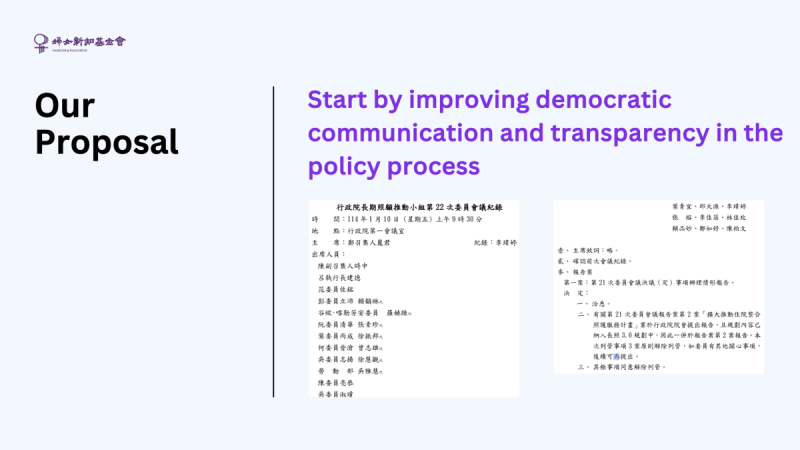【發言稿】台灣照顧學會第一屆年會圓桌論壇《長照政策的可能改革:挑戰、整合與未來方向》
東亞與歐洲照顧政策的比較:當代挑戰與未來展望
台灣照顧學會第一屆年會
Long-term Care policies in East Asia and Europe: Current challenges and future policy options in comparison
The 1st Annual Conference of the Taiwan Society for Care Research
2025年3月26日
March 26 (Wed) 2025
圓桌論壇《長照政策的可能改革:挑戰、整合與未來方向》
Roundtable Discussion
Possible Reform of Long-term Care Policies: Challenges, Integration and Future Directions
婦女新知基金會秘書長覃玉蓉發言稿
Yu-Rung Chyn (TW), The Awakening Foundation
台灣面臨人口高齡化與生育率下降的雙重壓力,不僅導致勞動力短缺,也讓勞工面臨「照顧時間貧窮」的困境,原因之一是有薪假不足。各國法定最低特休假與國定假日加總後,台灣在43個國家中員工休假權益排名倒數第四,形成了職涯發展與家庭照顧難以兼顧的困境。根據勞動部的調查,超過六成的受訪者表示曾因家庭照顧考慮辭職,且收入越低,考慮辭職的女性比例越高。有趣的是,收入最高的那群女性,辭職意願明顯上升,顯示她們同樣受到職場與照顧壓力的夾擊。這項調查結果對勞動政策與長照政策改革提出了重要警示。
Taiwan's aging population and declining birth rate are causing a labor shortage, while workers face "care time poverty" due to limited paid leave. When combining statutory annual leave and national holidays, Taiwan ranks fourth from the bottom out of 43 countries in terms of employee leave rights. This creates a pressing dilemma of balancing career development and family caregiving. A Ministry of Labor survey showed that over 60% of employees would consider quitting to care for family members. The lower the income, the higher the proportion of women considering quitting. Interestingly, even among high-earning women, the consideration to leave increases, likely due to the pressure of balancing career and family long-term care needs. This survey result serves as a critical reminder for labor and long-term care policy reforms.
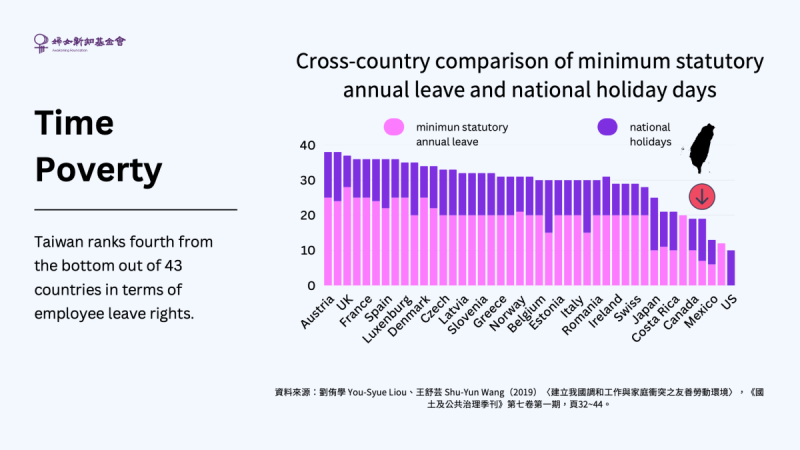
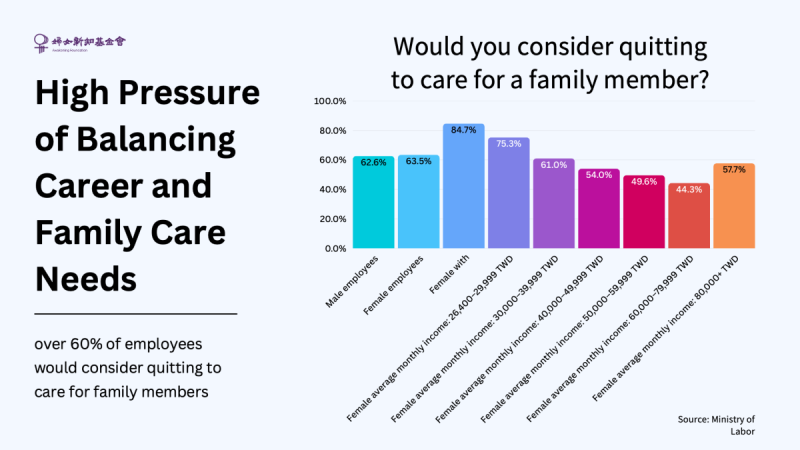
台灣家庭照顧者關懷總會、台北市產業總工會與婦女新知基金會共同倡議創設全新的長照安排假。我們主張增設30天連續有薪照顧假(薪資替代率至少為八成),以及150天的彈性照顧假以應急。婦女新知基金會也持續推動家庭照顧假的制度改革。目前台灣受僱者每年僅有七天家庭照顧假,公教人員可領薪,一般勞工則為無薪。我們認為,減少照顧者的薪資懲罰是避免其照顧離職的關鍵,因此訴求公教與一般勞工皆應享有有薪家庭照顧假。此外,照顧假應涵蓋所有有照顧需求的家庭成員,並考量「三明治世代」的壓力,建議將假期延長至每年21天,以更實際支持照顧者。
The Taiwan Family Caregivers Association and Confederation of Taipei Trade Unions, alongside the Awakening Foundation, have advocated for long-term care leave reforms. We propose adding 30 days of continuous leave with at least 80% of salary, plus 150 days of flexible leave to handle emergencies. The Awakening Foundation also advocates for reforming family care leave in Taiwan. Currently, employees are entitled to only seven days of leave per year, with public servants and teachers receiving paid leave, but regular employees' leave is unpaid. We believe reducing salary penalties for caregivers is crucial to preventing them from quitting. Therefore, we propose that both public servants and regular employees be entitled to paid family care leave. Additionally, family care leave should cover any family member in need of care, and given the needs of "sandwich" families, we recommend extending the leave to 21 days per year to better support caregivers.
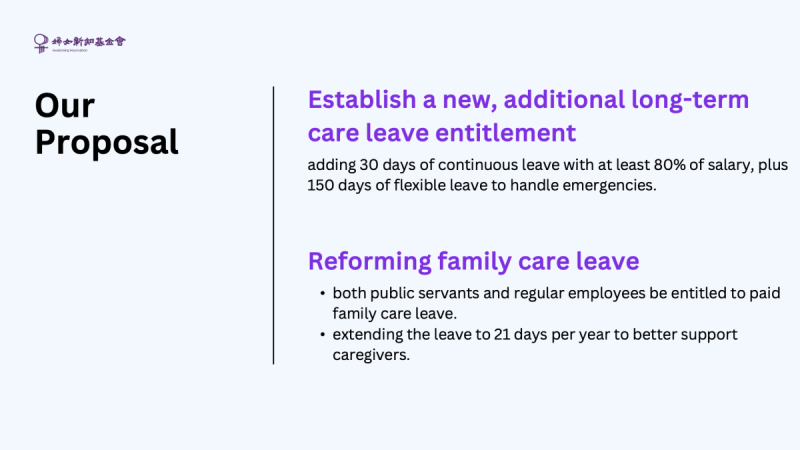
此外,現行長照體系中約有四分之一的照顧服務是由家庭聘僱的移工提供。然而,他們的人權保障相當薄弱。大多數家庭看護移工是女性,長時間工作、勞動條件惡劣,卻不受勞基法保障。由於她們與雇主同住,也更容易遭遇性騷擾甚至性侵的風險。許多移工若懷孕便被遣返回國,但因她們常須負擔高額仲介費,收入中斷會帶來極大衝擊。我們主張,應將這些人力轉為正式長照服務單位聘僱的照顧服務員,納入勞動法保障,以確保其基本權益。
Additionally, family-employed migrant workers provide care for a quarter of those needing long-term care in Taiwan. However, their human rights are poorly protected. Most family-employed migrant workers are women, working long hours under poor conditions without protection from labor laws. Since they live with their employers, they are exposed to risks of sexual harassment and even sexual assault. Many migrant workers are also dismissed or sent back to their home countries if they become pregnant, but since they are often burdened with large debts to pay for agency fees, losing their income suddenly can lead to severe hardship. We believe their employment should be transferred to formal long-term care providers, where labor laws can ensure their rights are upheld.
此項改革雖會增加短期成本,但有助於舒緩長照人力短缺。台灣目前約有9.3萬名本地居家照顧服務員,服務對象近36萬人,平均每人照顧3.87人。若22萬名移工能納入受勞動法保障、由衛福部管理的長照體系,除可改善其工作條件,也能潛在服務超過85萬名長照需求者,而非僅限22萬人。
This reform will increase short-term costs but will help alleviate the long-term care system's labor shortage. Taiwan currently has over 93,000 domestic caregiving service workers who provide home care to nearly 360,000 people. Caregivers employed by long-term care service organizations typically care for an average of 3.87 individuals. If 220,000 migrant workers in Taiwan work in the regulated, labor-law-protected workforce, integrated into the long-term care system under the Ministry of Health and Welfare, not only can the labor conditions of migrant workers improve, but they will also have the potential to care for more than 850,000 people in need of long-term care, instead of just 220,000.
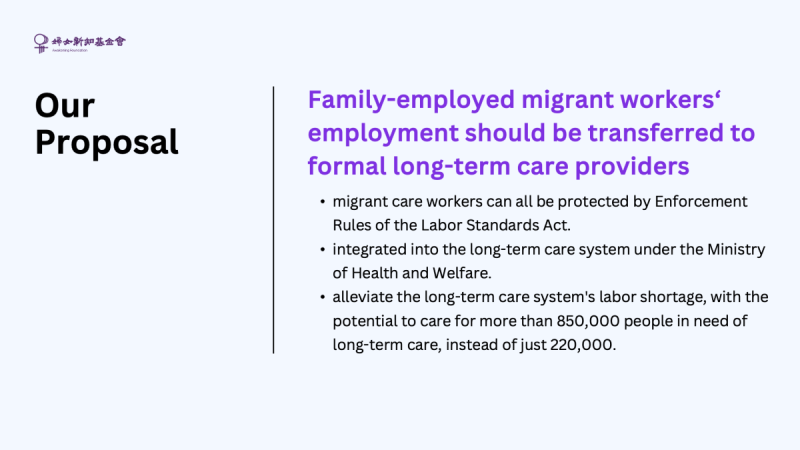
然而,改革面臨的挑戰不小,其中一項是使用者的疑慮。許多人認為,台灣目前的長照政策仍以官僚執行政策便利為主,而非以長照需求者及其照顧者的權益為核心。因此,從維持生活品質的角度來看,現行服務支持多為破碎、不連續且缺乏多元面向,例如對身心障礙者、新住民、原住民族及性別多元社群的需求考量。即使未來將移工從家庭聘僱轉至長照服務單位,也可能無法真正提升服務的實用性與可及性。另一項制度性困境是,除了服務本身,照顧者與使用者也需要安全的居住空間、無障礙環境與輔具支援,但這些資源管理與規劃分散於各部會,政策缺乏整合,也未以使用者的權益為出發點,導致第一線照顧者與家庭照顧者面臨許多不便與挑戰。
This reform proposal faces significant challenges, one of which is skepticism from service users. The concern is that Taiwan's current long-term care policy planning, in terms of service provision, still centers on the feasibility and convenience of bureaucratic execution, rather than focusing on the rights of people in need of long-term care and their caregivers. Therefore, from the perspective of maintaining quality of life, the current support provided is fragmented, discontinuous, and lacks a multi-dimensional approach, such as considerations for people with disabilities, marriage immigrants, indigenous people, and LGBTQ+ communities. As a result, some people question whether, even if migrant workers' employment relationships are moved out of the family and transferred to long-term care service providers under government policy, the services provided would still not be user-friendly or meet the needs. Another bureaucratic challenge is that, in addition to requiring services, people also need a secure living space, accessible environments, and assistive devices. However, these policies are fragmented across different government agencies, and they are not integrated with the needs and rights of long-term care service users at the core. This lack of integration also creates many inconveniences and challenges for caregivers and frontline care service workers.
儘管改革幅度廣泛,我們仍可以從改善政策制定過程中的民主溝通機制開始。目前行政院長照推動小組等溝通機制有限且不透明,雖然會議紀錄上網公開,但內容僅列出出席者、議程與結論,缺乏決策依據與討論過程,讓公民社會難以監督與參與。未來的長照政策應納入更強化的民主參與機制,讓多元需求能被聽見,也為政策改革開啟新的可能性。
The reforms are extensive, but we can start by improving democratic communication in the policy process. Taiwan's current communication mechanisms, such as the Executive Yuan's Long-Term Care Promotion Task Force, are limited and lack transparency. While meeting records are available online, they only show basic details like attendees, agenda, and decisions, without explaining the rationale behind decisions or the evidence supporting them. This makes it hard for civil society to monitor policies. Long-term care policies should include stronger democratic participation, allowing diverse needs to be heard and opening the door for future reforms.
齊藤彌生教授剛剛分享的共同生產模式,以及名古屋的案例,就是由下而上民主參與的一個很好的例子,其精神與服務模式值得參考。
The co-production model and the case from Nagoya that Professor Yayoi Saito just shared are excellent examples of bottom-up democratic participation. The underlying principles and service model are highly valuable and worth referencing.
